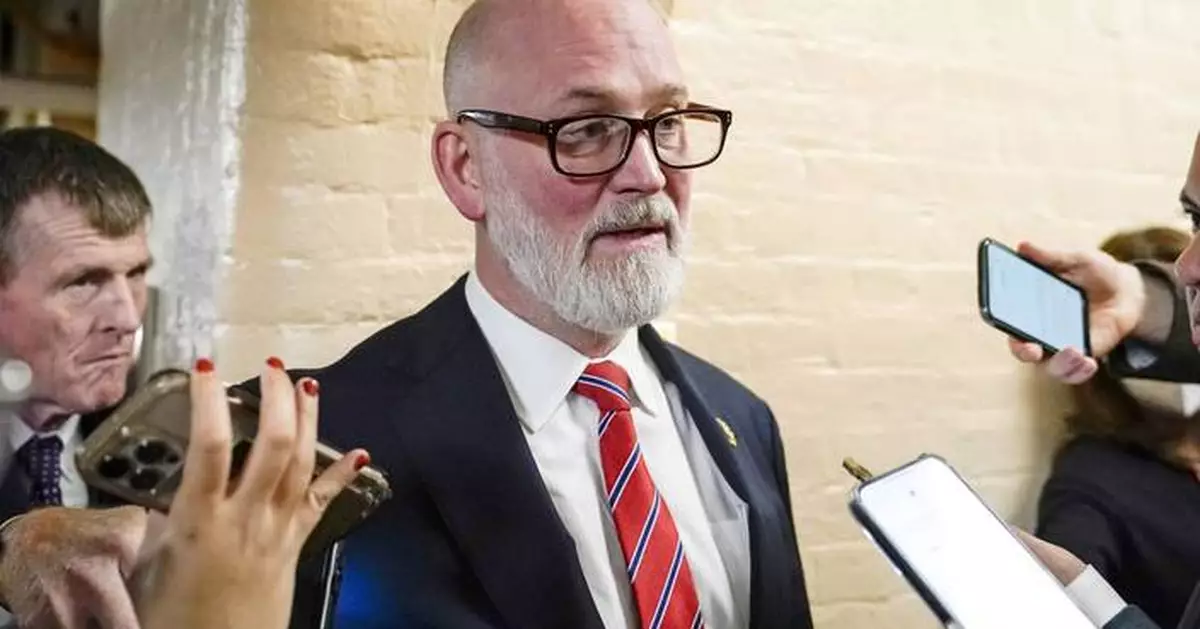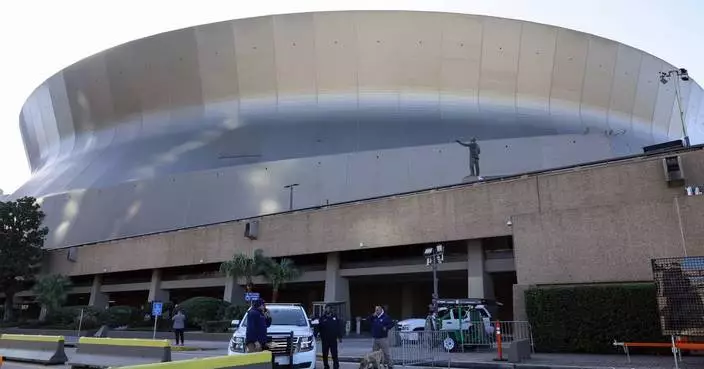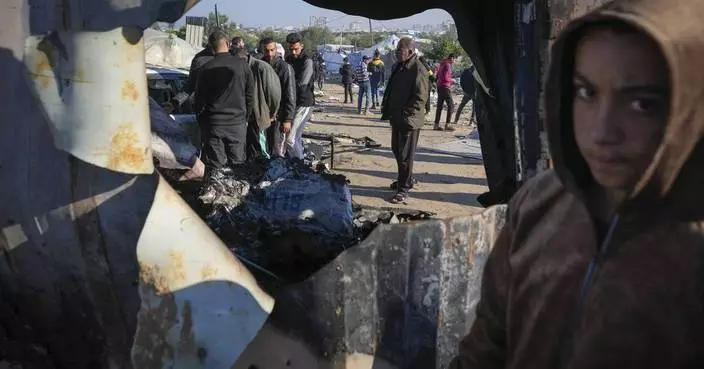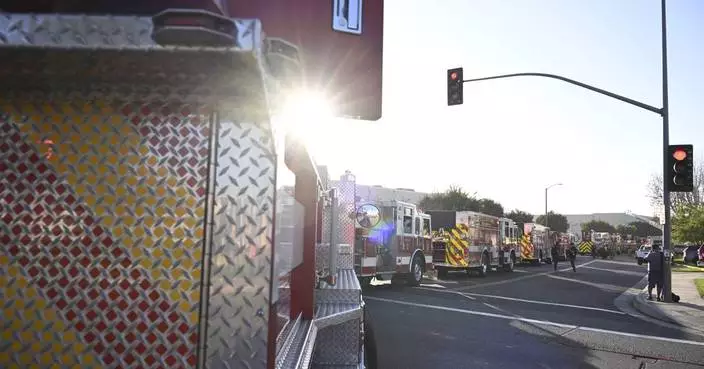MADISON, Wis. (AP) — Republicans won six congressional races in Wisconsin in Tuesday's election, turning back Democratic challenges in a western Wisconsin swing district and in an open seat in a heavily GOP corner of the state.
In the most hotly contested race, Republican Rep. Derrick Van Orden won reelection in western Wisconsin over Democratic challenger and political activist Rebecca Cooke. A political newcomer and former gas station chain owner, Tony Wied, won an open seat in the Green Bay area, defeating a doctor who tried to make the race about abortion rights.
Here's a look at the three most-watched congressional races in Wisconsin:
Van Orden won reelection to a second term in western Wisconsin’s 3rd Congressional District, which had been represented by a Democrat for 26 years before it flipped in 2022.
Van Orden is a former Navy SEAL who was at the Capitol during the Jan. 6, 2021, insurrection and remains one of President-elect Donald Trump’s loudest backers in Wisconsin.
He was a top target for Democrats. Cooke, a former small business owner who worked as a waitress during the campaign, won a three-person primary to take on Van Orden. She has raised more money than any other Democratic challenger in the state, a sign of Democratic optimism for the race.
With the Mississippi River and Minnesota to the west, the district includes the rolling hills of the Driftless Area and Chippewa Falls. From Illinois, it stretches 250 miles (400 kilometers) north past Prairie du Chien, known for its Cabela’s outdoor gear distribution center and 19th-century riverside historic sites.
Republican U.S. Rep. Bryan Steil won reelection to a fourth term representing southeast Wisconsin.
He defeated Peter Barca, the last Democrat to hold the seat in 1995. Barca served less than two years.
Barca previously served two stints in the state Legislature over more than 18 years and resigned after more than five years as state revenue secretary to take on Steil.
The seat, once held by former Speaker Paul Ryan, was made more competitive for Democrats following the latest round of redistricting. The district north of Illinois includes the cities of Kenosha, Racine and Janesville.
Steil issued a statement thanking voters for their trust and promising to lower costs and “have a nation that works for everyone.”
Wied, running his first race, won the contest for northeast Wisconsin’s open congressional district, defeating an abortion rights advocate.
Wied had Trump's endorsement in his race against Dr. Kristin Lyerly, an obstetrician who sued to overturn Wisconsin’s abortion ban. Trump carried Wisconsin, boosting other Republican candidates like Wied.
Lyerly tried to make the race in the heavily Republican district about abortion.
The seat was vacant after the surprise resignation earlier this year of Republican Mike Gallagher, a sometime critic of Trump’s.
The district includes cities such as Green Bay as well as rural areas.
Wied promised in a statement to bring “some Wisconsin commonsense to Washington to lower everyday costs, secure the southern border, and reign in out-of-control government spending.”
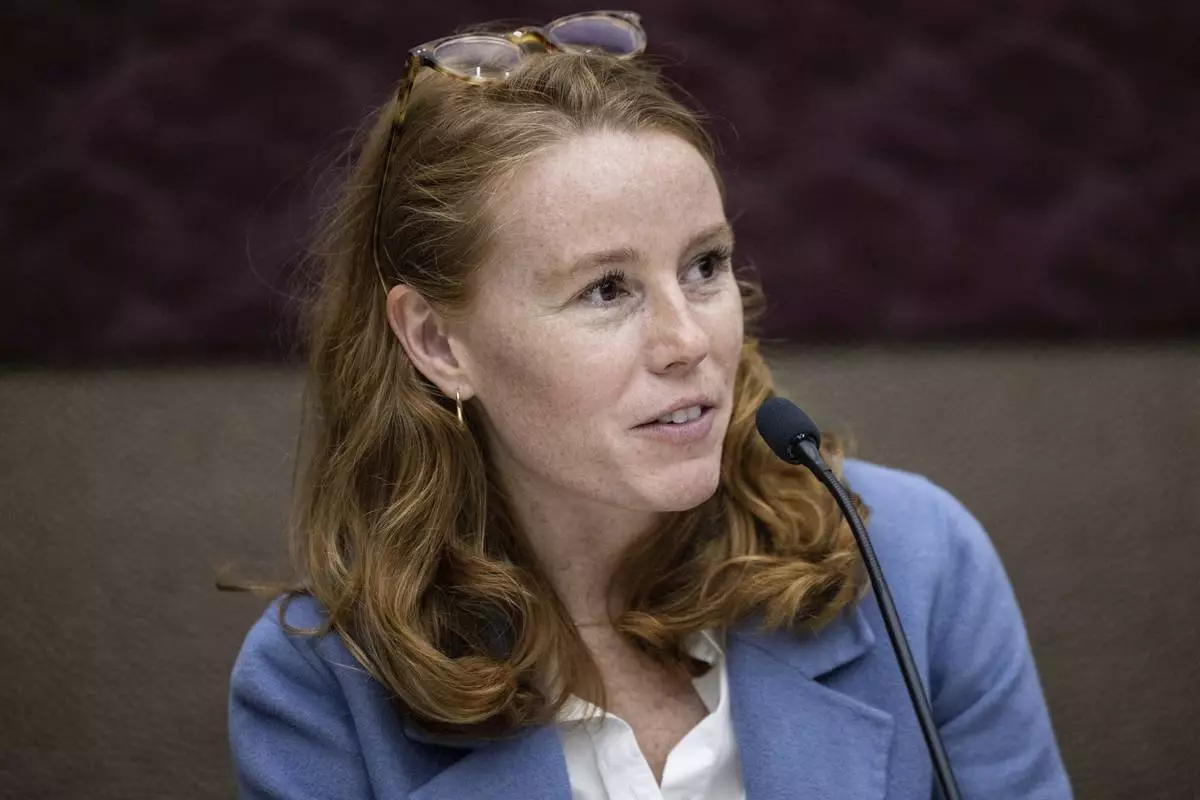
FILE - Rebecca Cooke, Democratic candidate for Wisconsin's 3rd Congressional District, attends a candidate's forum, May 1, 2024 in La Crosse, Wis. (Saskia Hatvany/La Crosse Tribune via AP)
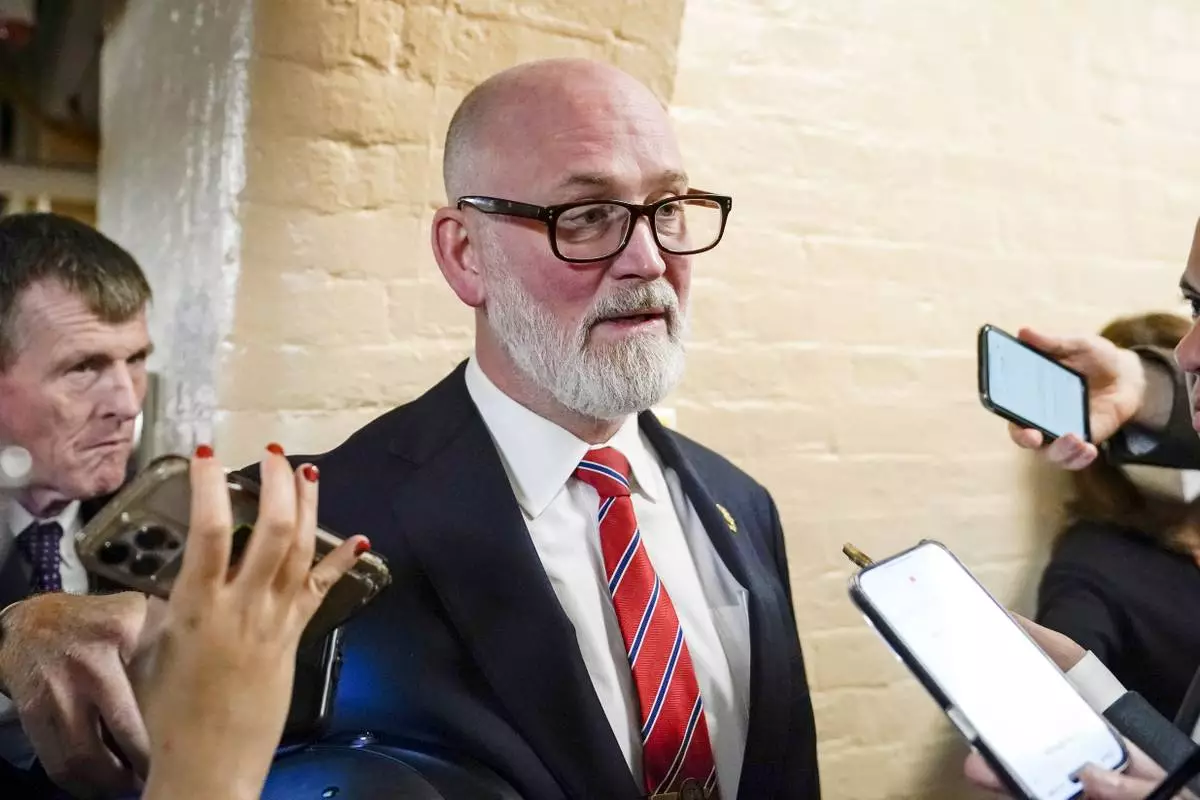
FILE - Rep. Derrick Van Orden, D-Wis., speaks with reporters as he arrives for the Republican caucus meeting at the Capitol in Washington, Oct. 19, 2023. (AP Photo/Alex Brandon, File)
SEOUL, South Korea (AP) — South Korean investigators arrived at the presidential residence with a warrant to detain impeached President Yoon Suk Yeol over his short-lived imposition of martial law, but faced resistance from presidential security staff as hundreds of Yoon’s supporters gathered outside vowing to protect him.
It’s the latest confrontation in a political crisis that has paralyzed South Korean politics and seen two heads of state impeached in under a month. It began on Dec. 3 when Yoon, apparently frustrated that his policies were blocked by an opposition-dominated parliament, declared martial law and dispatched troops to surround the National Assembly.
Parliament overturned the declaration within hours in an unanimous vote and impeached Yoon himself on Dec. 14, while South Korean authorities opened a criminal investigation into the events. Yoon has remained defiant, ignoring requests for questioning and vowing to fight to remain in office.
Four hours after dozens of investigators and police officers were seen entering the gate of the residence in Seoul to execute a warrant for Yoon’s detention, the dramatic scene appeared to have developed into a standoff.
The anti-corruption agency didn’t immediately reply to questions about whether investigators successfully entered Yoon’s residential building, but South Korea’s YTN television reported scuffles as investigators and police confronted the presidential security forces.
Seok Dong-hyeon, one of several lawyers on Yoon’s legal team, confirmed that the investigators arrived at the building but said it was unlikely that they would be able to detain the president on Friday. He said the agency’s efforts to detain Yoon were “reckless” and showed an “outrageous discard for law.”
South Korea’s Defense Ministry confirmed that the investigators and police officers got past a military unit guarding the residence’s grounds before arriving at the building. The presidential security service, which controls the residence itself, refused to comment on whether its members were confronting investigators and whether they planned to block the detention attempt.
The hourslong standoff prompted the liberal opposition Democratic Party to call on the country’s acting leader, Deputy Prime Minister Choi Sang-mok, to order the presidential security service to stand down. Choi, who also serves as finance minister, didn’t immediately comment on the situation.
“We warn presidential security service chief Park Jong-joon not to further participate in a rebellion. Do not drag the upright staff of the presidential security service and other public officials into the depths of crime,” said Jo Seung-lae, a Democratic lawmaker. Choi must “remember that swiftly addressing the rebellion and preventing further chaos is your responsibility,” Jo said.
In a defiant New Year’s message to conservative supporters rallying outside his residence, Yoon said he will “fight to the end” against “anti-state forces.” His lawyers have described the warrant as “invalid” and “illegal,” and said that the presidential security force could arrest police trying to execute it.
Thousands of police officers gathered at Yoon’s residence and formed a perimeter around a growing group of pro-Yoon protesters, who braved subfreezing temperatures for hours, waving South Korean and American flags while chanting slogans in his support. There were no immediate reports of major clashes.
A Seoul court issued a warrant for Yoon’s detention on Tuesday after he evaded multiple requests to appear for questioning and blocked searches of his office in Seoul, hindering an investigation into whether his ill-conceived power grab on Dec. 3 amounted to rebellion.
The warrant is valid for one week, and investigators may make another attempt to detain Yoon if they are unable to do so on Friday.
Investigators from the anti-corruption agency were earlier seen loading boxes into several vehicles before leaving their building in the city of Gwacheon early in the morning. Television footage later showed some of those vehicles weaving between police buses that tightly packed and barricaded the streets near Yoon’s residence.
If Yoon is detained, the anti-corruption agency will have 48 hours to either request a warrant for his formal arrest or release him. Yoon’s defense minister, police chief and several top military commanders have already been arrested over their roles in the period of martial law.
Yoon Kap-keun, another lawyer representing the president, described the investigators’ efforts to detain him as illegal and said they would plan to pursue unspecified legal steps against the anti-corruption agency.
Yoon Suk Yeol’s lawyers have argued the court’s detainment warrant is invalid, claiming that the anti-corruption agency lacks the legal authority to investigate rebellion charges. They also accuse the court of bypassing a law that says locations potentially linked to military secrets cannot be seized or searched without the consent of the person in charge.
The lawyers have said police officers would be exceeding their legal authority if they assist in detaining Yoon, and could face arrest by either the “presidential security service or any citizens.” They didn’t elaborate further on the claim.
Critics accused Yoon of inciting his supporters to obstruct attempts to detain him. South Korean law permits anyone to make an arrest to stop an active crime.
The Democratic Party, which drove the legislative vote that impeached Yoon Suk Yeol on Dec. 14 over his imposition of martial law, accused the president of trying to mobilize his supporters to block his detention and called for law enforcement authorities to execute the warrant immediately.
Yoon Kap-keun, the president’s lawyer, filed a challenge with the Seoul Western District Court on Thursday to block both the detention warrant for Yoon Suk Yeol and a related search warrant for his residence. The lawyer argued that both warrants violate criminal laws and the constitution.
Yoon’s presidential powers were suspended following a National Assembly vote to impeach him on Dec. 14 over his imposition of martial law, which lasted only hours but has triggered weeks of political turmoil, halted high-level diplomacy and rattled financial markets. Yoon’s fate now lies with the Constitutional Court, which has begun deliberations on whether to uphold the impeachment and formally remove Yoon from office or reinstate him.
To formally end Yoon’s presidency, at least six justices on the nine-member Constitutional Court must vote in favor.
The National Assembly voted last week to also impeach Prime Minister Han Duck-soo, who became acting president after Yoon’s powers were suspended, over his reluctance to fill three Constitutional Court vacancies ahead of the court’s review of Yoon’s case.
Facing growing pressure, the new acting president, Choi, appointed two new justices on Tuesday, which could increase the chances of the court upholding Yoon’s impeachment.
Yoon’s imposition of martial law ended after only six hours when the National Assembly voted 190-0 to lift it despite attempts by heavily armed soldiers to prevent them from voting.
Yoon has defended his martial law decree as a necessary act of governance, portraying it as a temporary warning against the Democratic Party, which he has described as an “anti-state” force obstructing his agenda with its legislative majority.
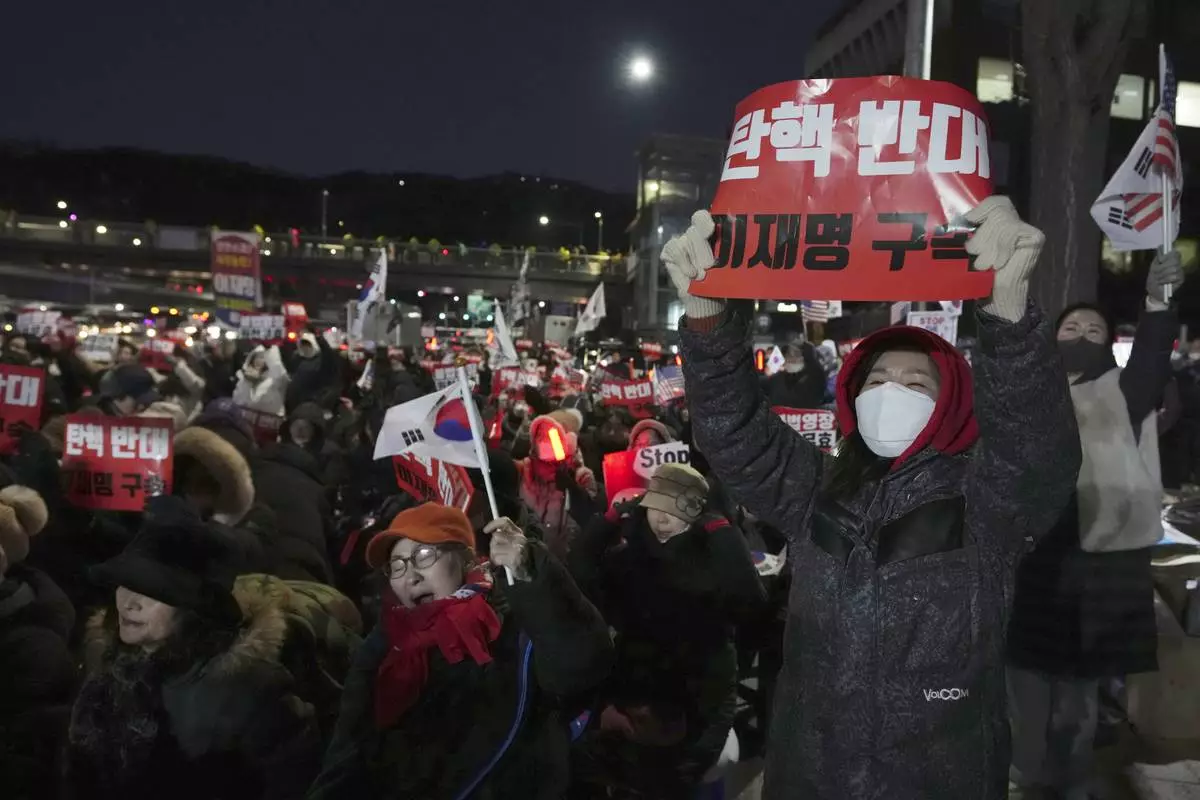
Supporters of impeached South Korean President Yoon Suk Yeol stage a rally to oppose a court having issued a warrant to detain Yoon, as police offices stand guard near the presidential residence in Seoul, South Korea, Friday, Jan. 3, 2025. The sign reads "Oppose Impeachment." (AP Photo/Lee Jin-man)
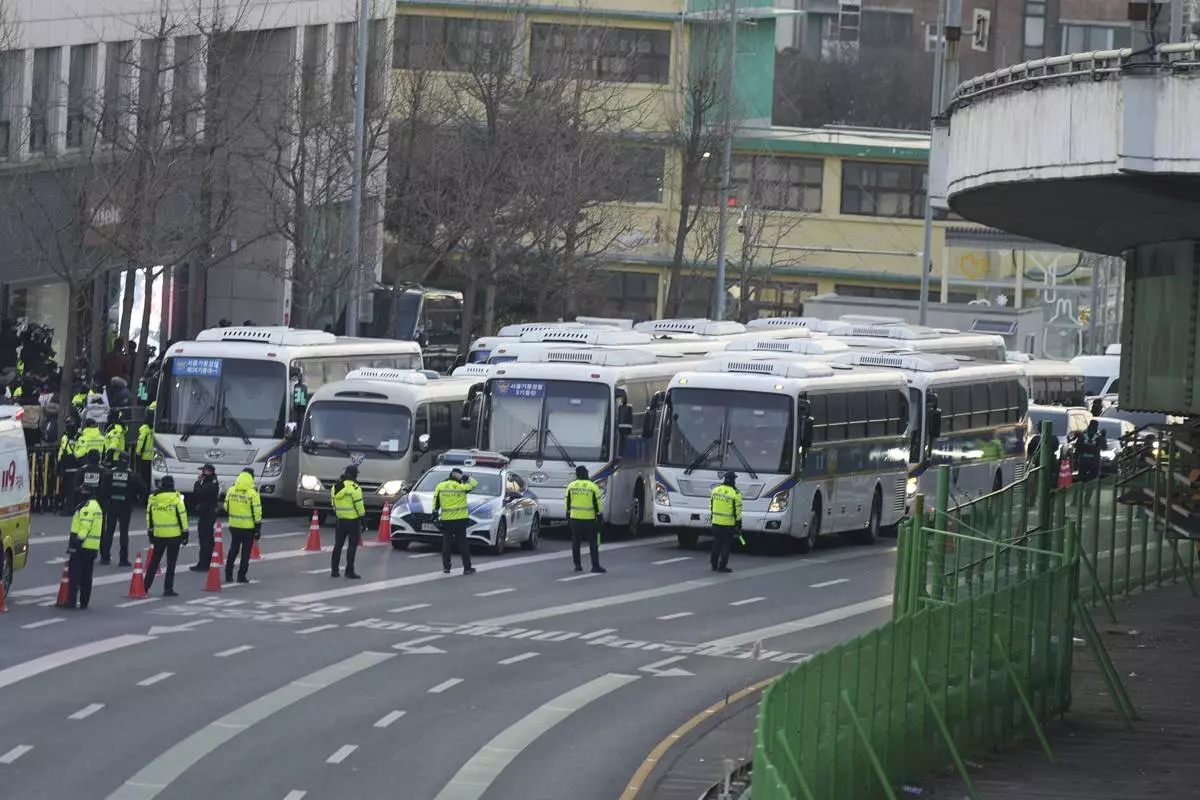
Police vehicles are seen near the gate of the presidential residence as supporters of impeached South Korean President Yoon Suk Yeol stage a rally to oppose a court having issued a warrant to detain Yoon, in Seoul, South Korea, Friday, Jan. 3, 2025. (AP Photo/Lee Jin-man)
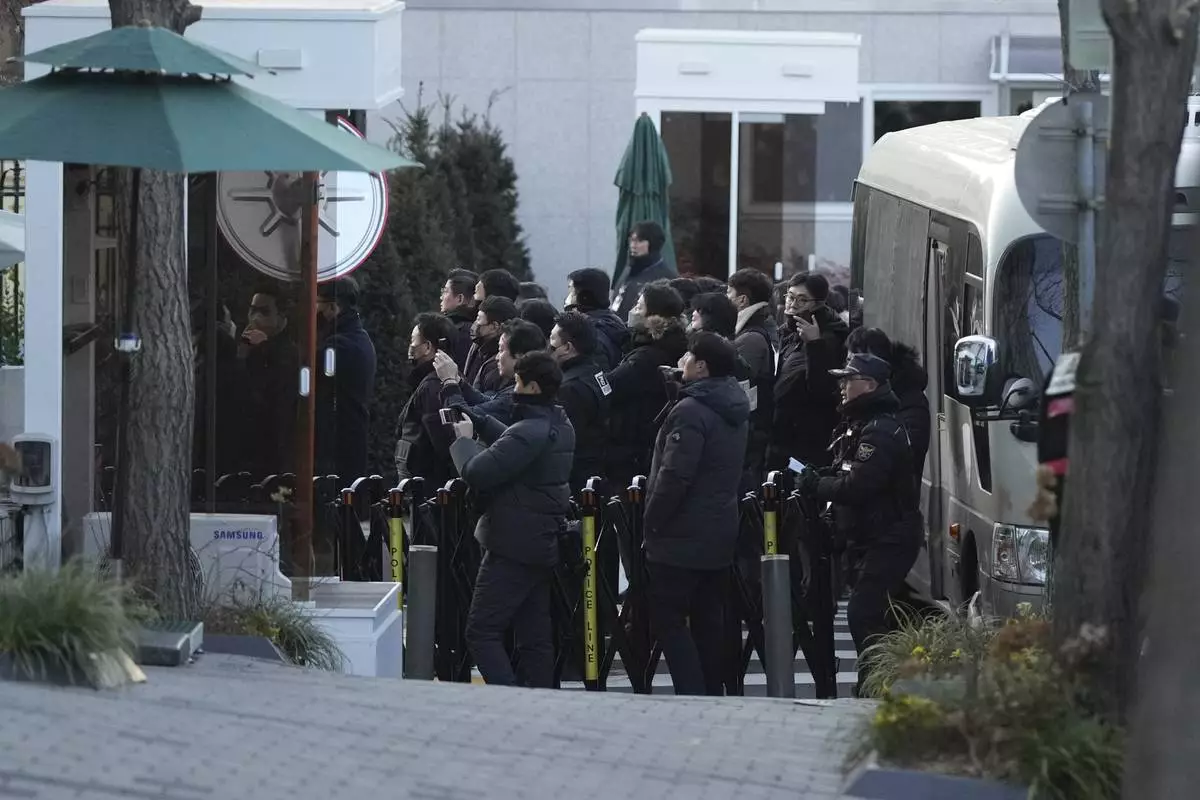
Police officers arrive at the gate of the presidential residence as supporters of impeached South Korean President Yoon Suk Yeol stage a rally to oppose a court having issued a warrant to detain Yoon, in Seoul, South Korea, Friday, Jan. 3, 2025. (AP Photo/Lee Jin-man)
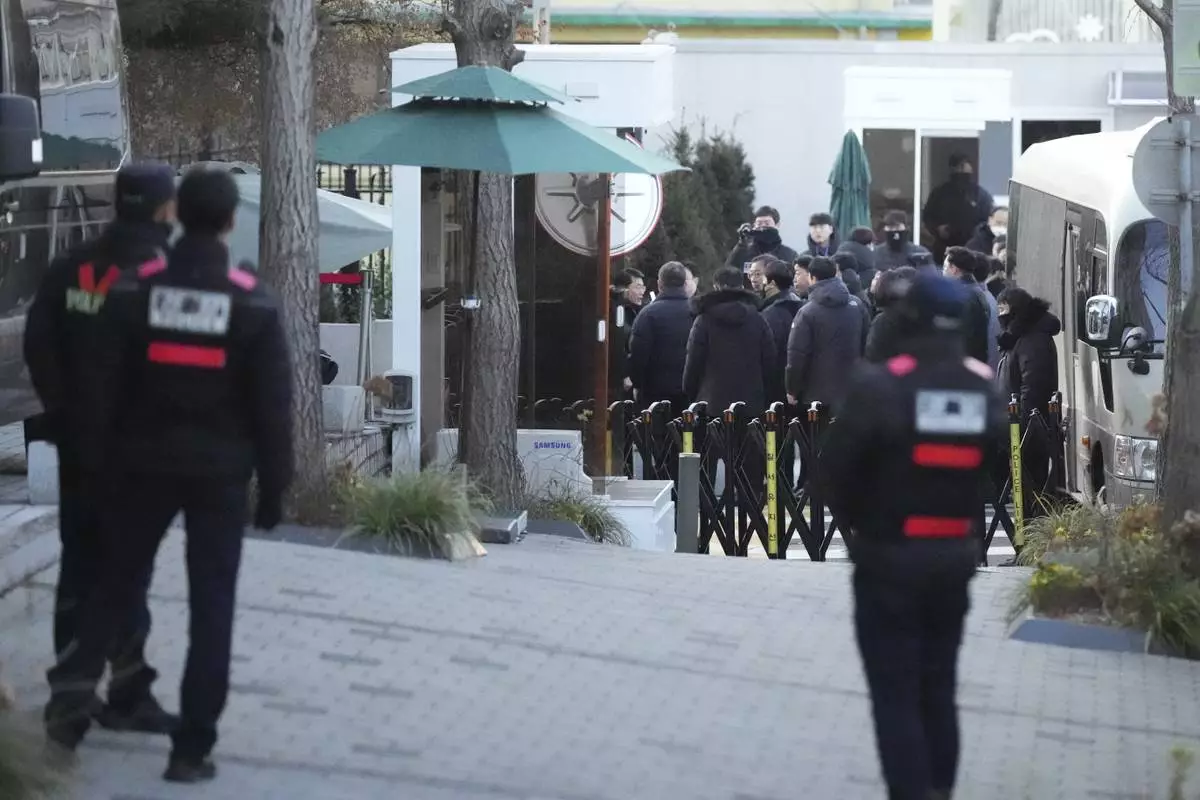
Investigators from the Corruption Investigation Office for High-ranking Officials arrive at the gate of the presidential residence as supporters of impeached South Korean President Yoon Suk Yeol stage a rally to oppose a court having issued a warrant to detain Yoon, in Seoul, South Korea, Friday, Jan. 3, 2025. (AP Photo/Lee Jin-man)
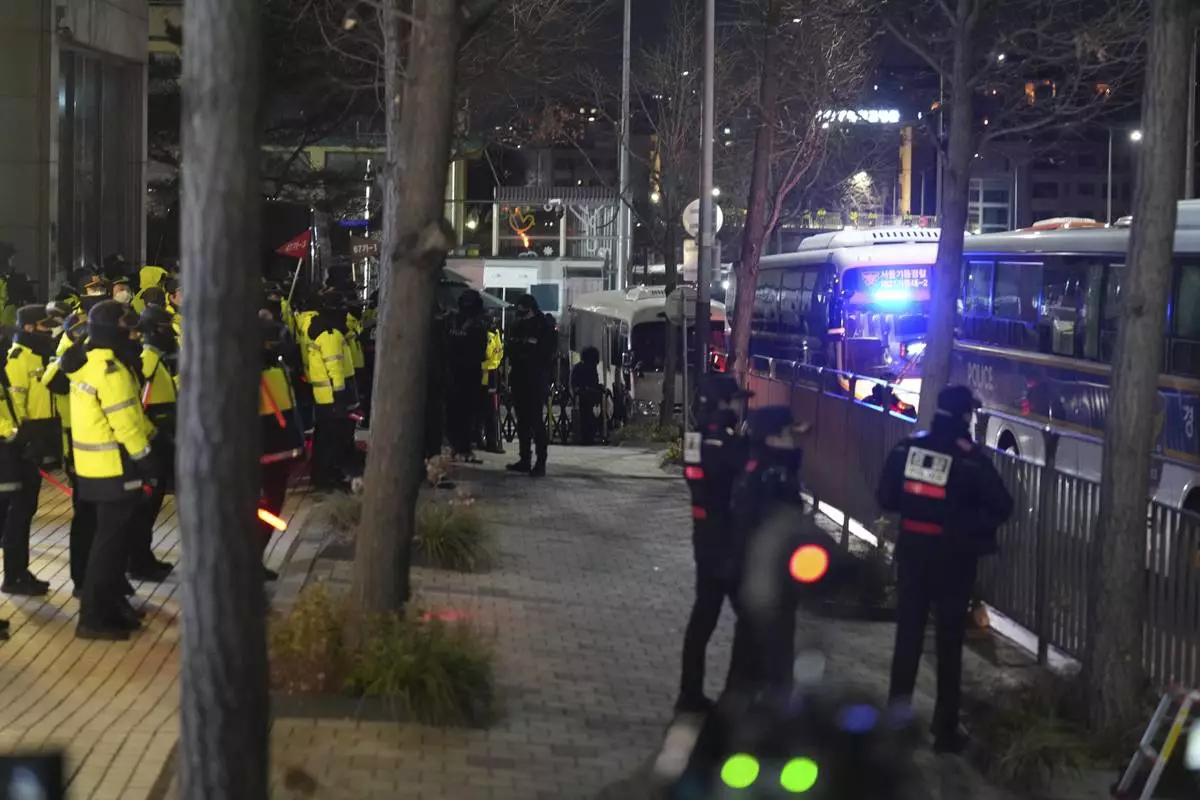
Police and barricades are placed in front of the gate of the presidential residence as supporters of impeached South Korean President Yoon Suk Yeol stage a rally to oppose a court having issued a warrant to detain Yoon, in Seoul, South Korea, Friday, Jan. 3, 2025. (AP Photo/Lee Jin-man)
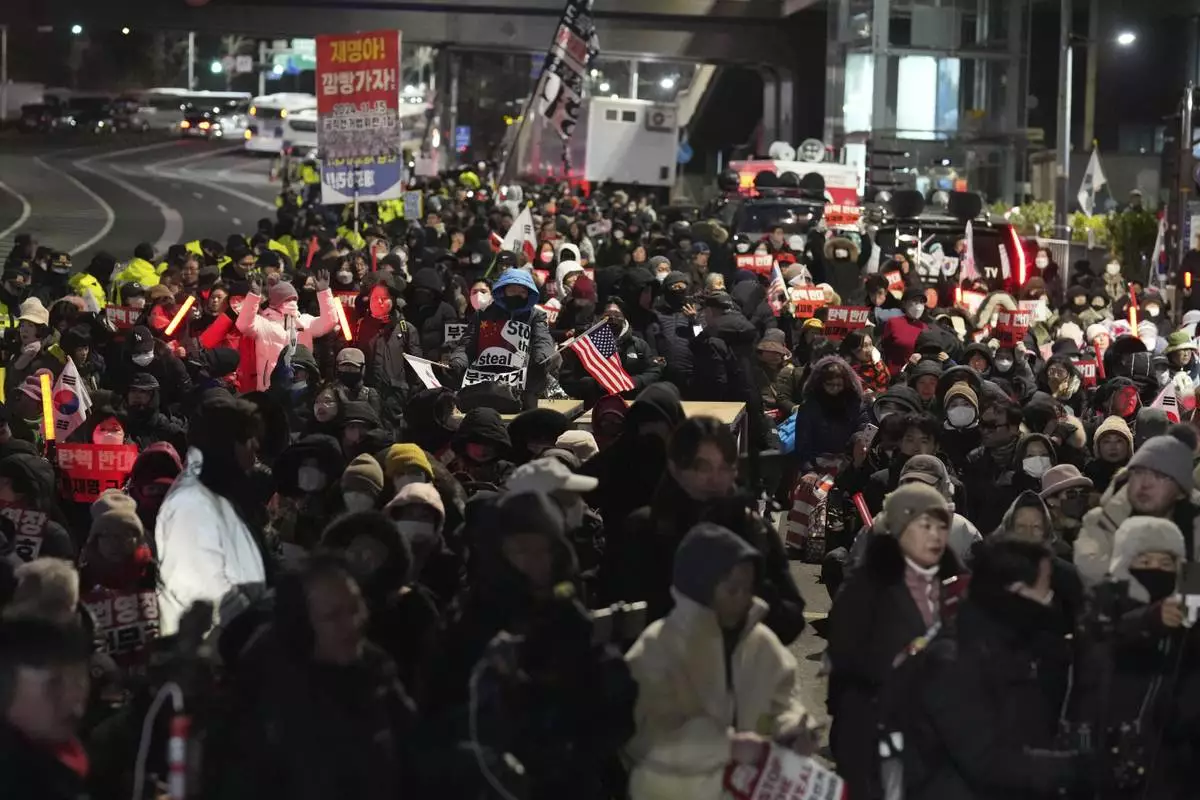
Supporters of impeached South Korean President Yoon Suk Yeol stage a rally to oppose a court having issued a warrant to detain Yoon, as police offices stand guard near the presidential residence in Seoul, South Korea, Friday, Jan. 3, 2025. (AP Photo/Lee Jin-man)
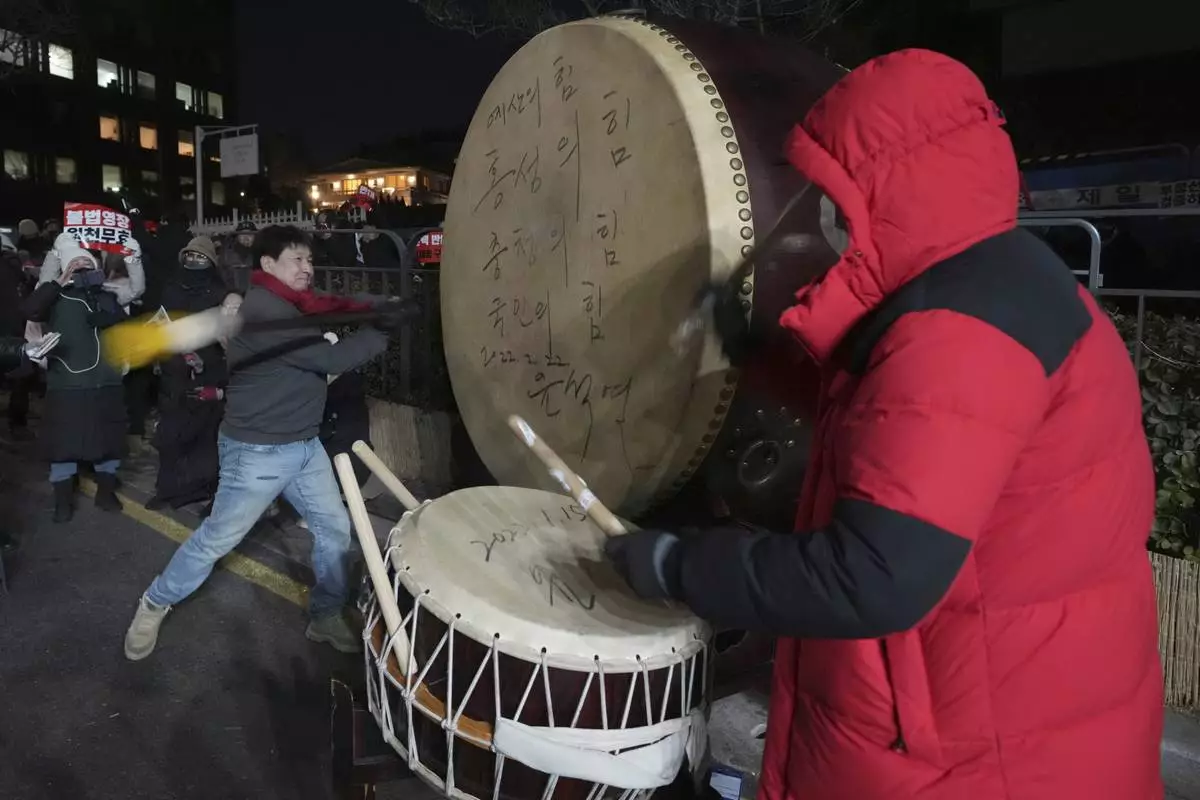
Supporters of impeached South Korean President Yoon Suk Yeol stage a rally to oppose a court having issued a warrant to detain Yoon, as police offices stand guard near the presidential residence in Seoul, South Korea, Friday, Jan. 3, 2025. (AP Photo/Lee Jin-man)
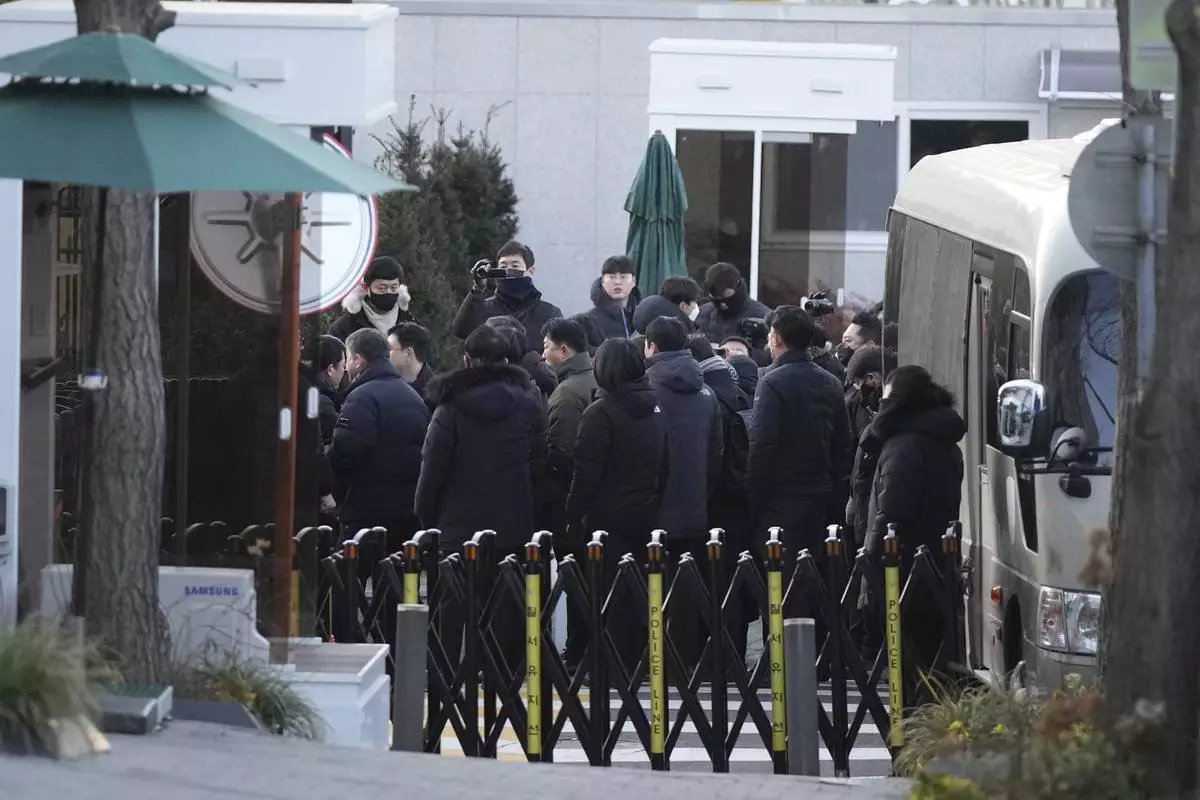
Investigators from the Corruption Investigation Office for High-ranking Officials arrive at the gate of the presidential residence as supporters of impeached South Korean President Yoon Suk Yeol stage a rally to oppose a court having issued a warrant to detain Yoon, in Seoul, South Korea, Friday, Jan. 3, 2025. (AP Photo/Lee Jin-man)
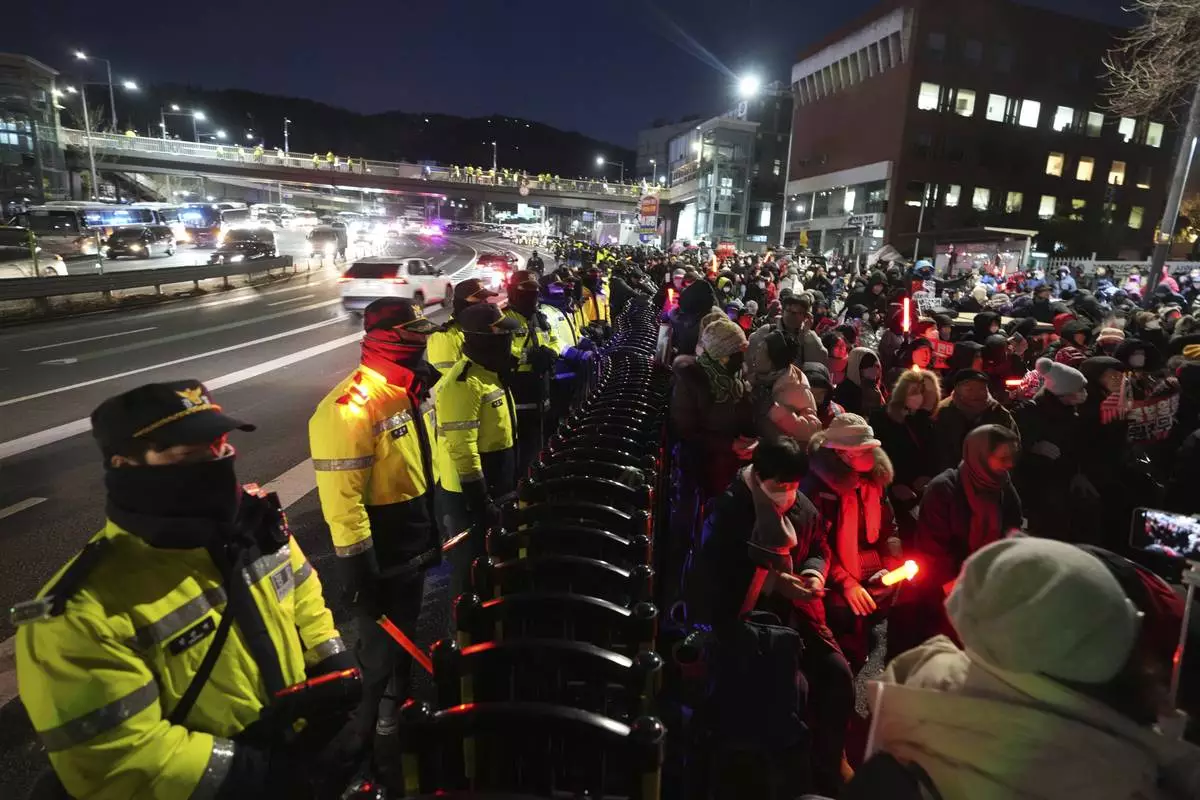
Supporters of impeached South Korean President Yoon Suk Yeol stage a rally to oppose a court having issued a warrant to detain Yoon, as police offices stand guard near the presidential residence in Seoul, South Korea, Friday, Jan. 3, 2025. (AP Photo/Lee Jin-man)
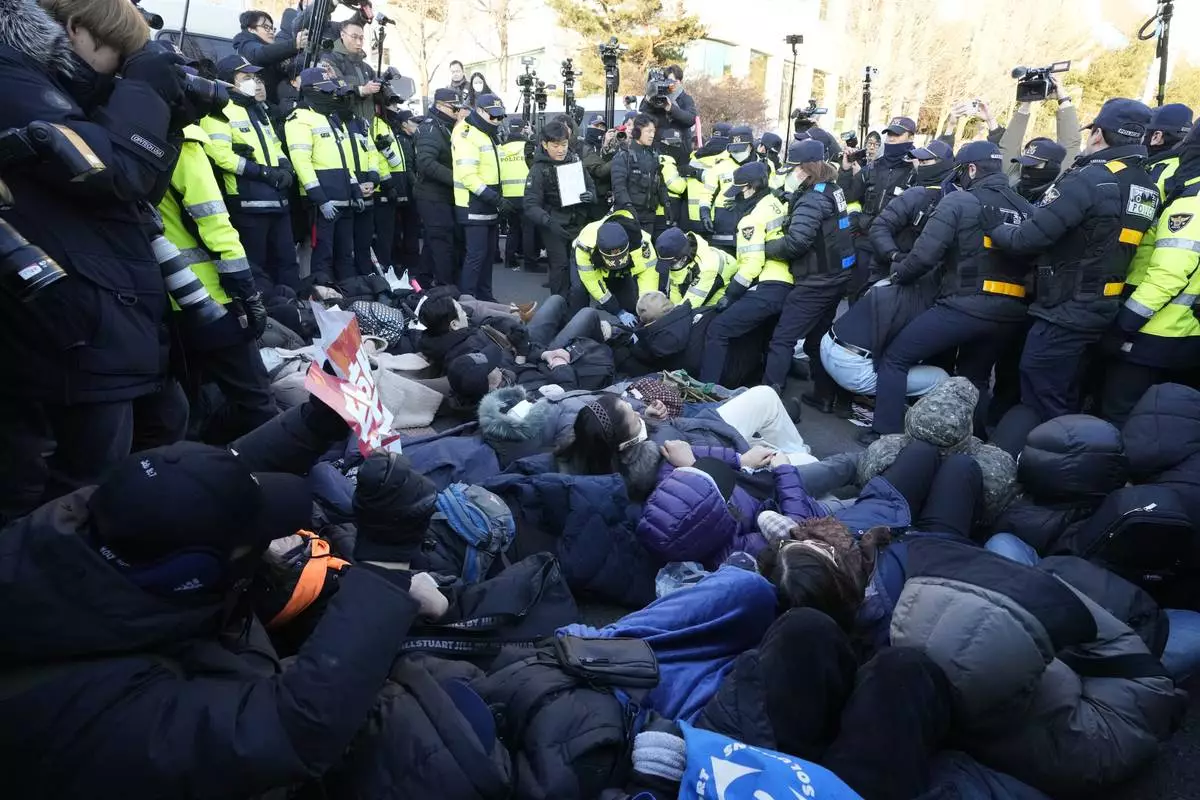
Police officers drag away supporters of impeached South Korean President Yoon Suk Yeol as Yoon faces potential arrest after a court on Tuesday approved a warrant for his arrest, near the presidential residence in Seoul, South Korea, Thursday, Jan. 2, 2025. (AP Photo/Ahn Young-joon)
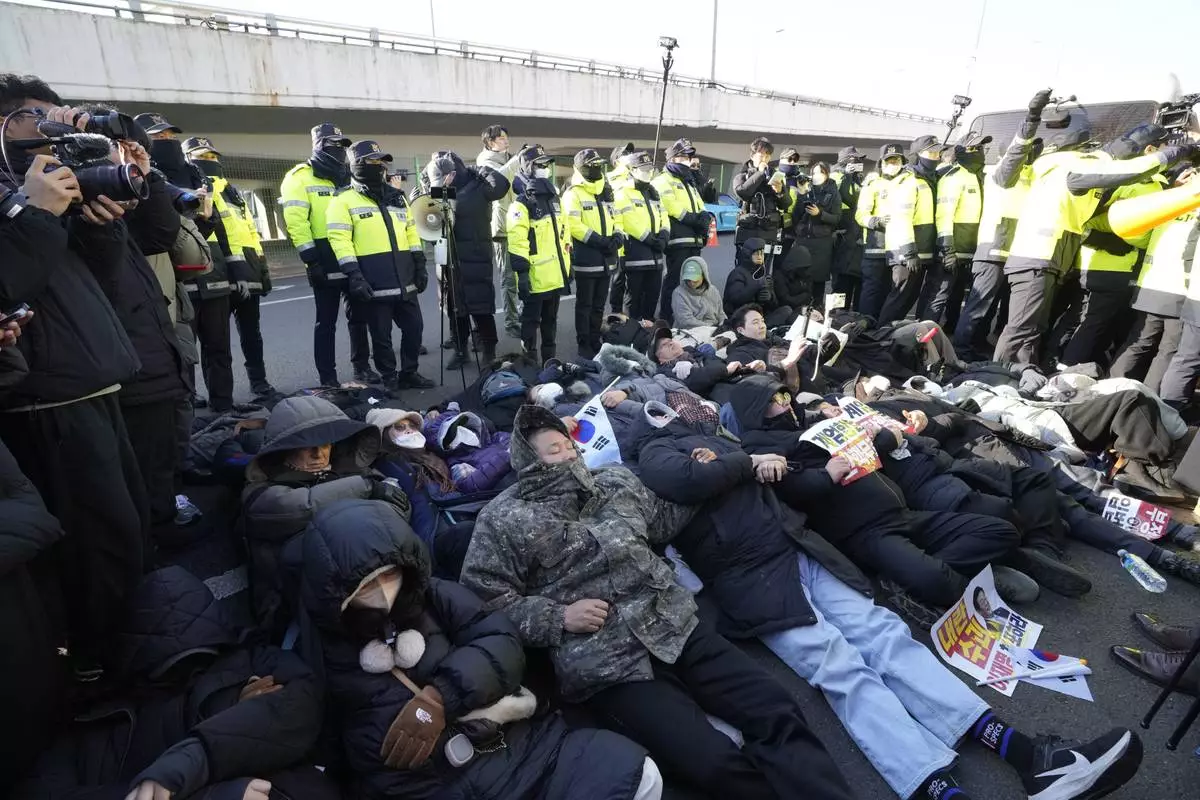
Supporters of impeached South Korean President Yoon Suk Yeol lie down on the ground as Yoon faces potential arrest after a court on Tuesday approved a warrant for his arrest, near the presidential residence in Seoul, South Korea, Thursday, Jan. 2, 2025. (AP Photo/Ahn Young-joon)
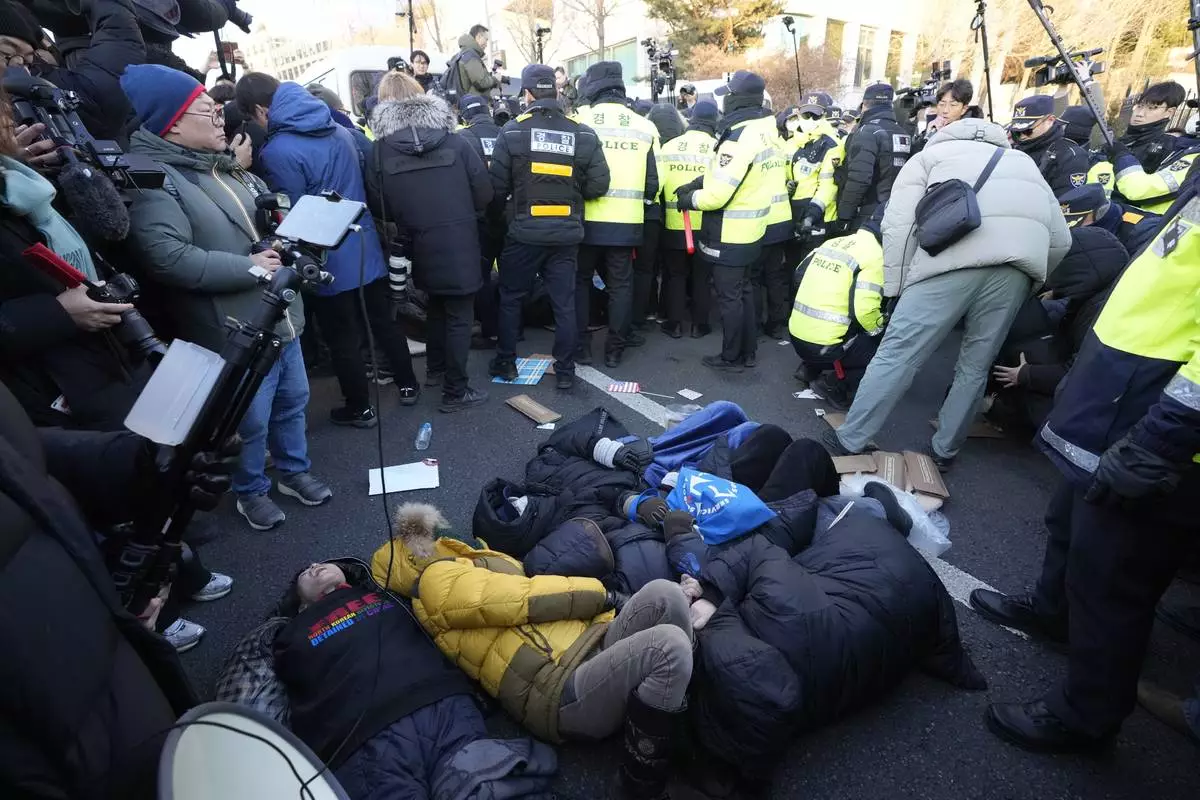
Supporters of impeached South Korean President Yoon Suk Yeol lie down on the ground as Yoon faces potential arrest after a court on Tuesday approved a warrant for his arrest, near the presidential residence in Seoul, South Korea, Thursday, Jan. 2, 2025. (AP Photo/Ahn Young-joon)
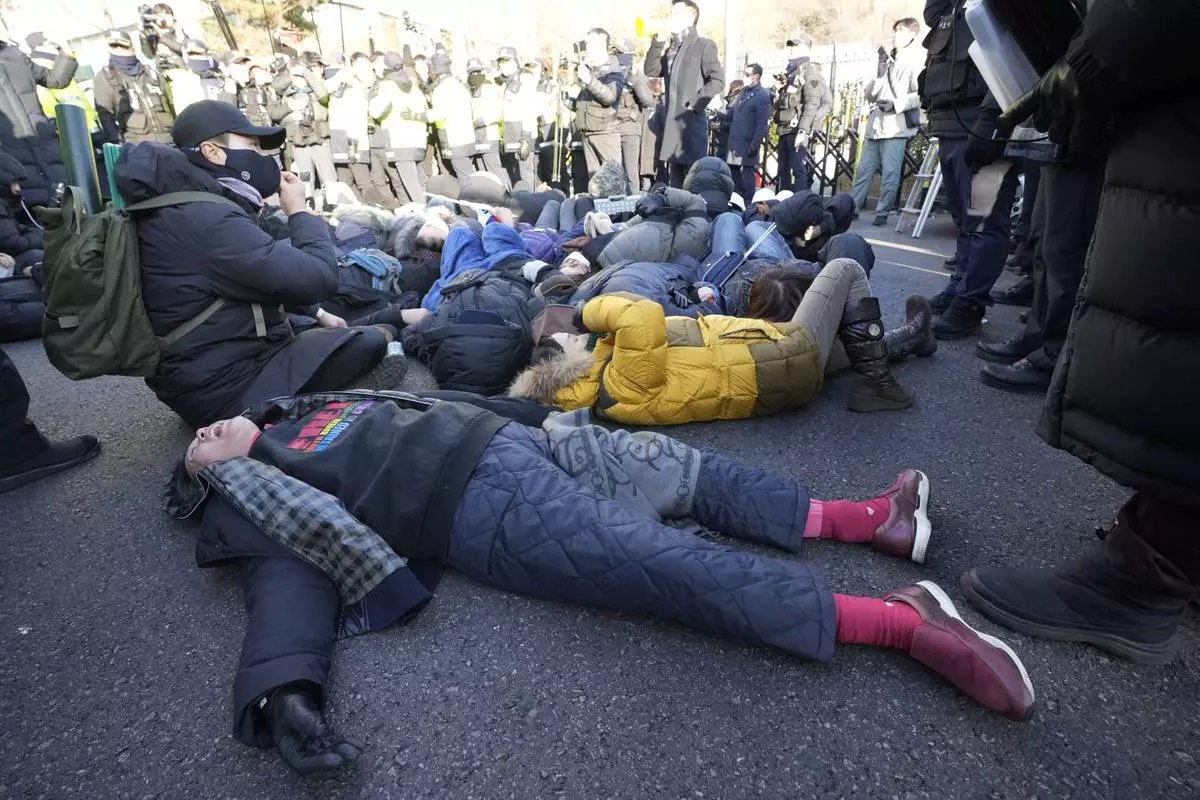
Supporters of impeached South Korean President Yoon Suk Yeol lie down on the ground as Yoon faces potential arrest after a court on Tuesday approved a warrant for his arrest, near the presidential residence in Seoul, South Korea, Thursday, Jan. 2, 2025. (AP Photo/Ahn Young-joon)
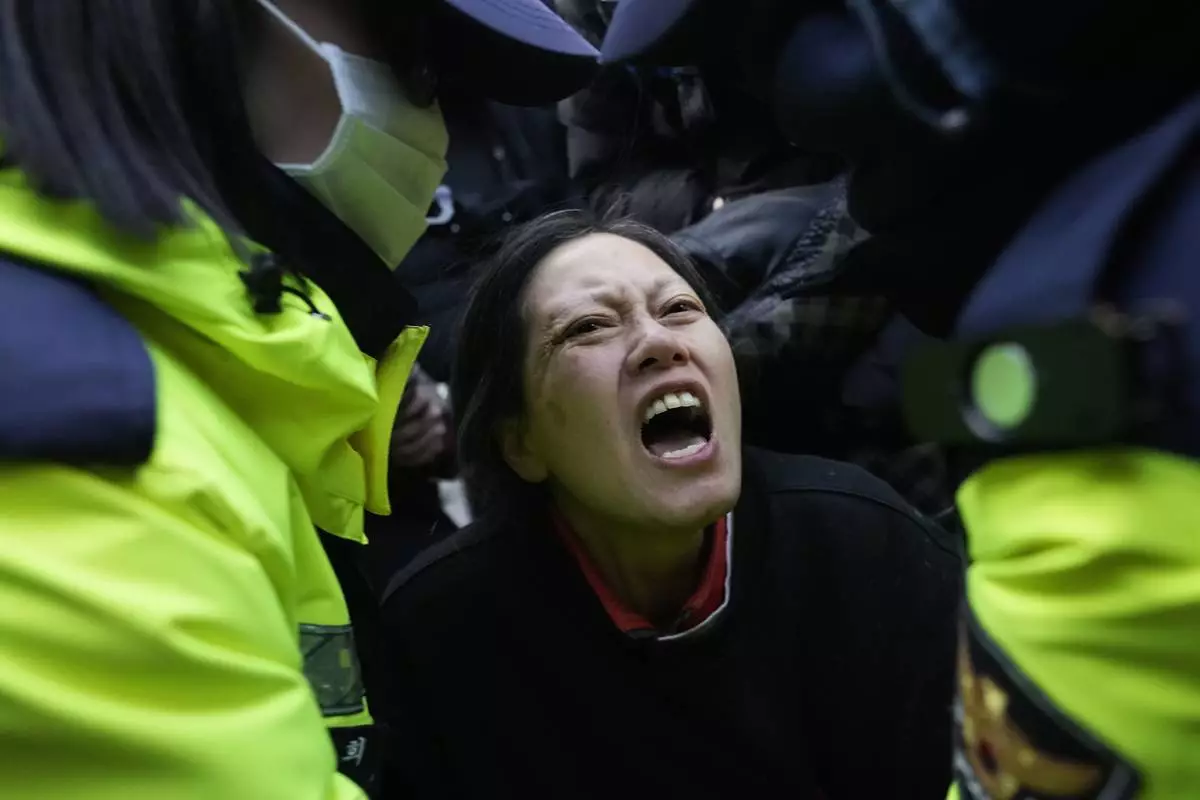
Police officers escort away a supporter of impeached South Korean President Yoon Suk Yeol as Yoon faces potential arrest after a court on Tuesday approved a warrant for his arrest, near the presidential residence in Seoul, South Korea, Thursday, Jan. 2, 2025. (AP Photo/Ahn Young-joon)
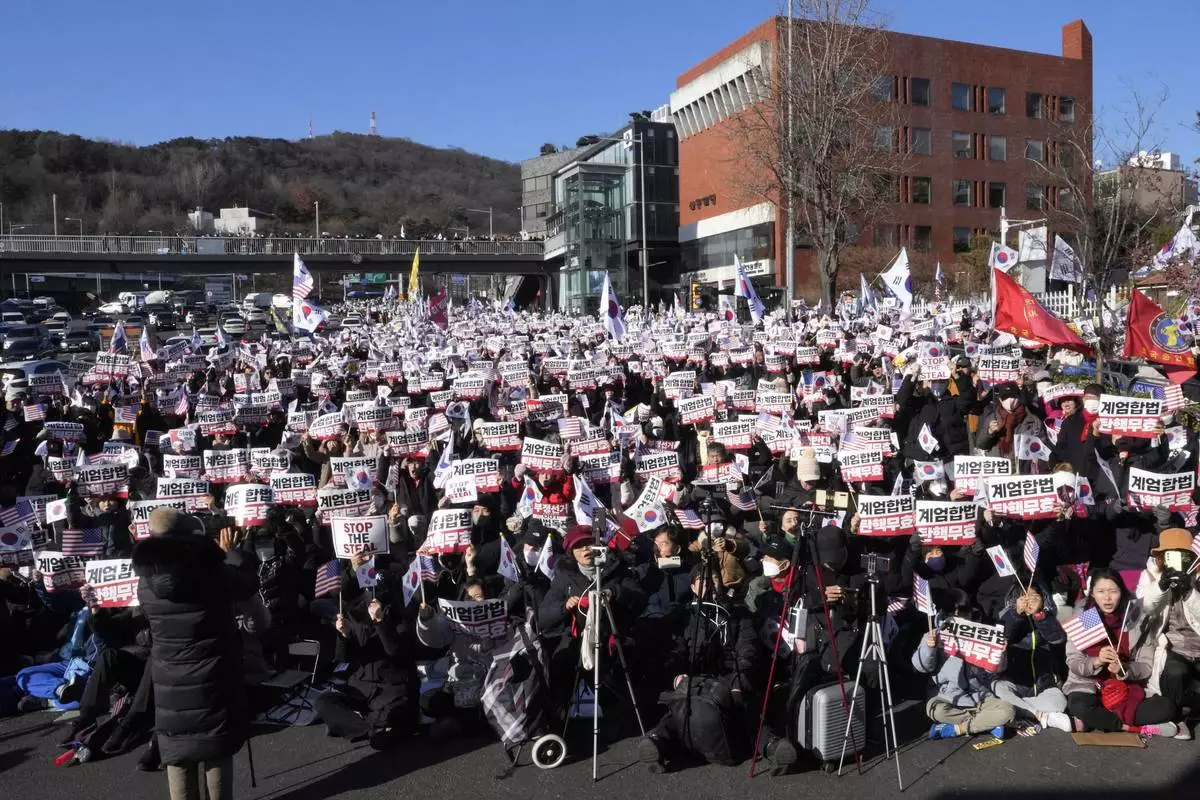
Supporters of impeached South Korean President Yoon Suk Yeol stage a rally to oppose a court having issued a warrant to detain Yoon, near the presidential residence in Seoul, South Korea, Thursday, Jan. 2, 2025. The signs read, "Oppose impeachment." (AP Photo/Ahn Young-joon)
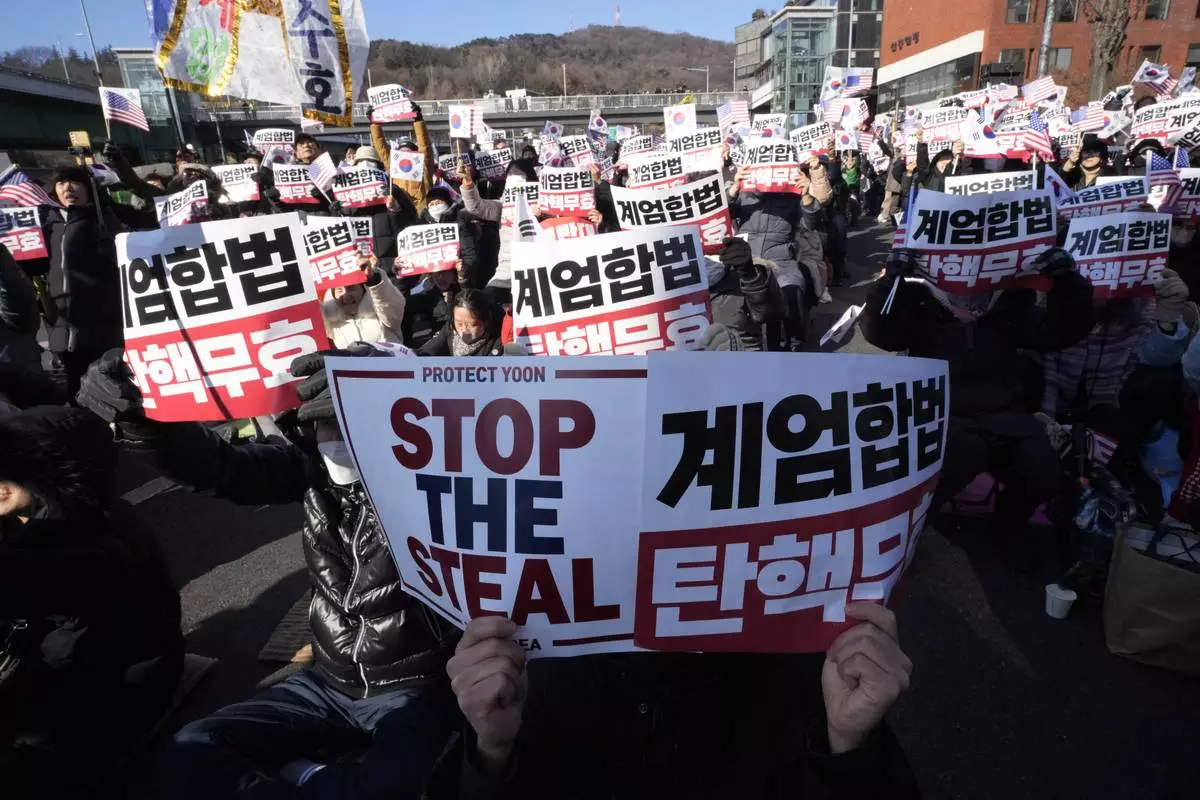
Supporters of impeached South Korean President Yoon Suk Yeol stage a rally to oppose a court having issued a warrant to detain Yoon, near the presidential residence in Seoul, South Korea, Thursday, Jan. 2, 2025. The signs read, "Oppose impeachment." (AP Photo/Ahn Young-joon)
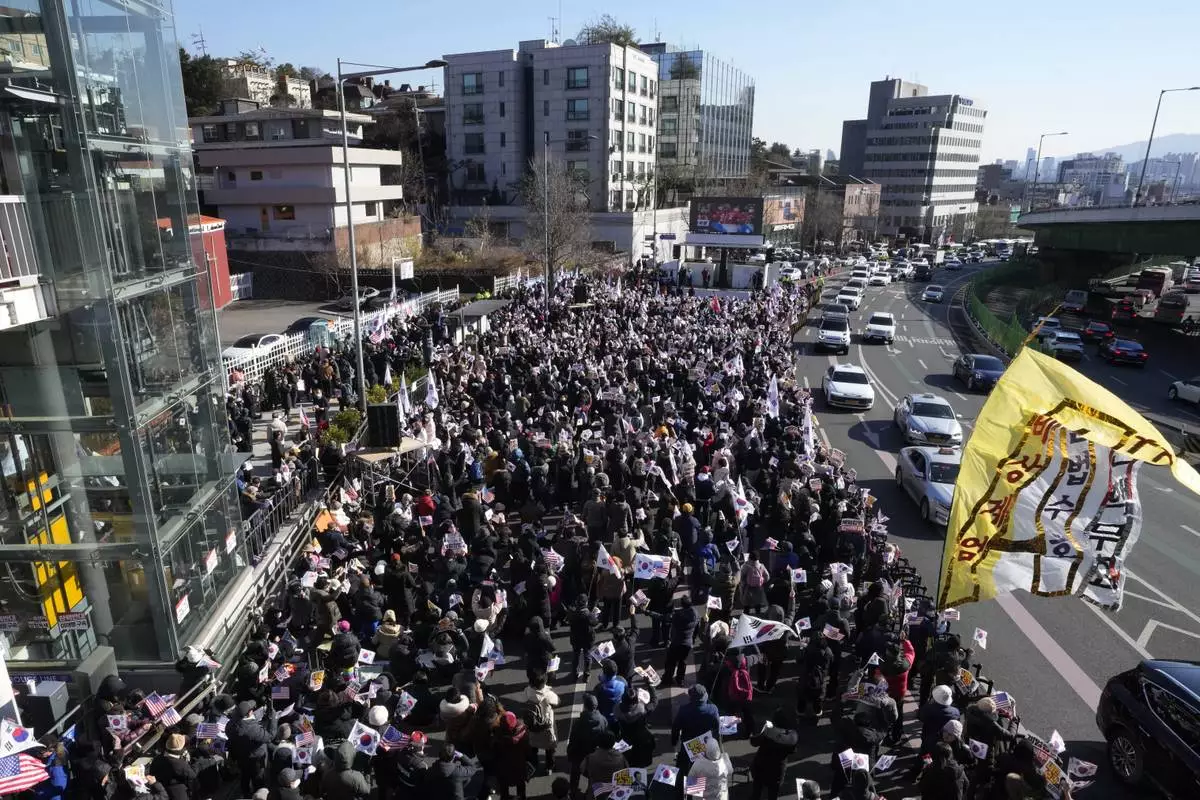
Supporters of impeached South Korean President Yoon Suk Yeol stage a rally to oppose a court having issued a warrant to detain Yoon, near the presidential residence in Seoul, South Korea, Thursday, Jan. 2, 2025. (AP Photo/Ahn Young-joon)
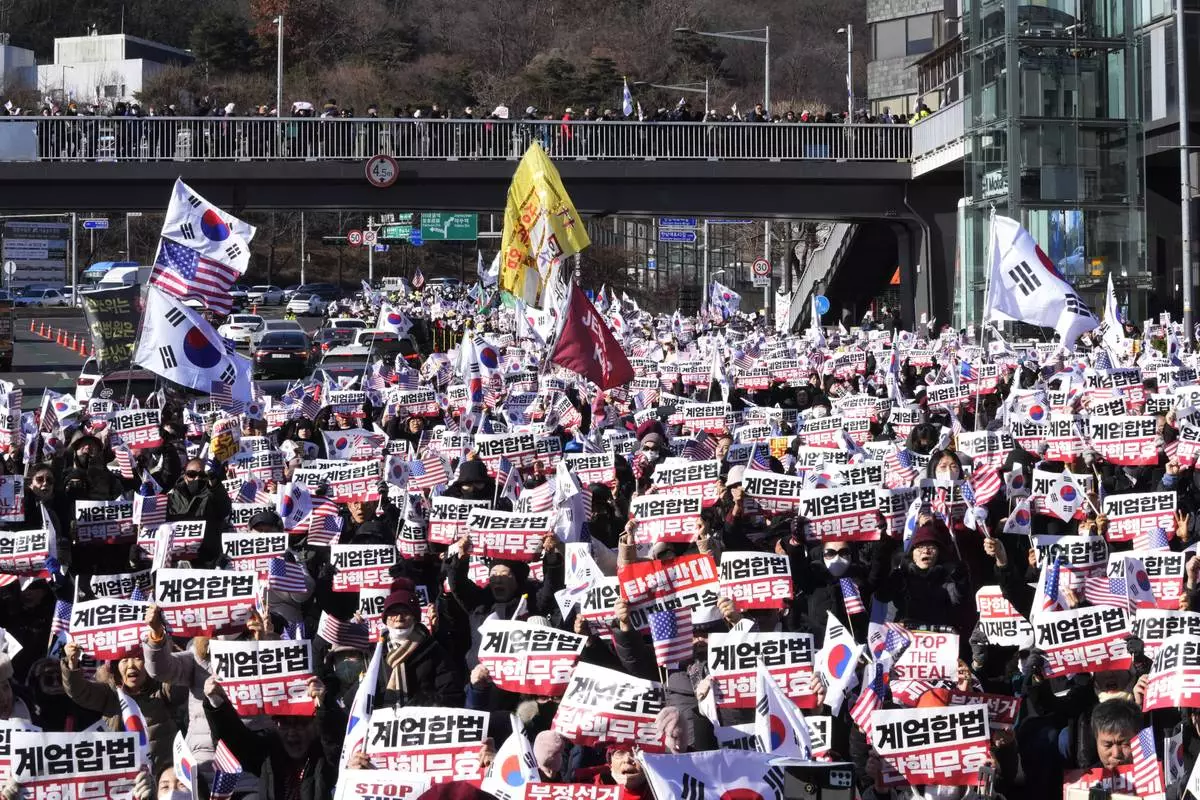
Supporters of impeached South Korean President Yoon Suk Yeol stage a rally to oppose a court having issued a warrant to detain Yoon, near the presidential residence in Seoul, South Korea, Thursday, Jan. 2, 2025. The signs read, "Oppose impeachment." (AP Photo/Ahn Young-joon)
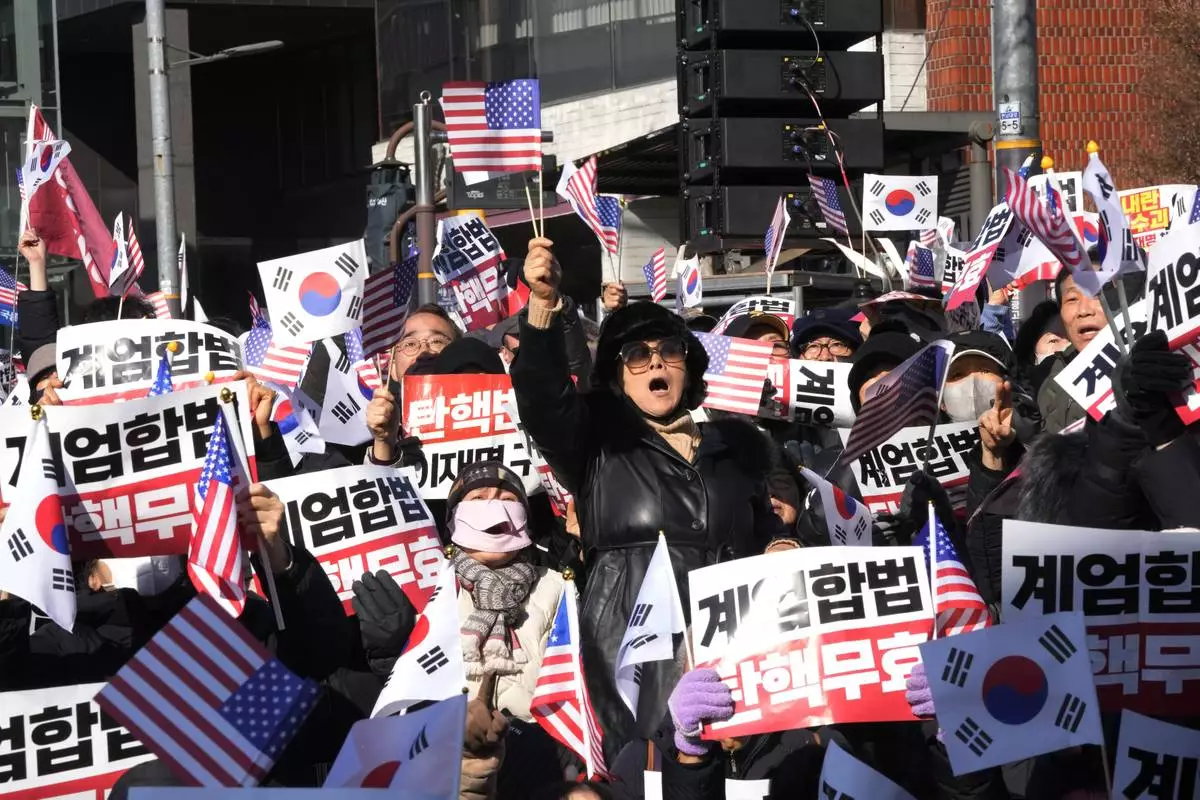
Supporters of impeached South Korean President Yoon Suk Yeol stage a rally to oppose a court having issued a warrant to detain Yoon, near the presidential residence in Seoul, South Korea, Thursday, Jan. 2, 2025. The signs read, "Oppose impeachment." (AP Photo/Ahn Young-joon)
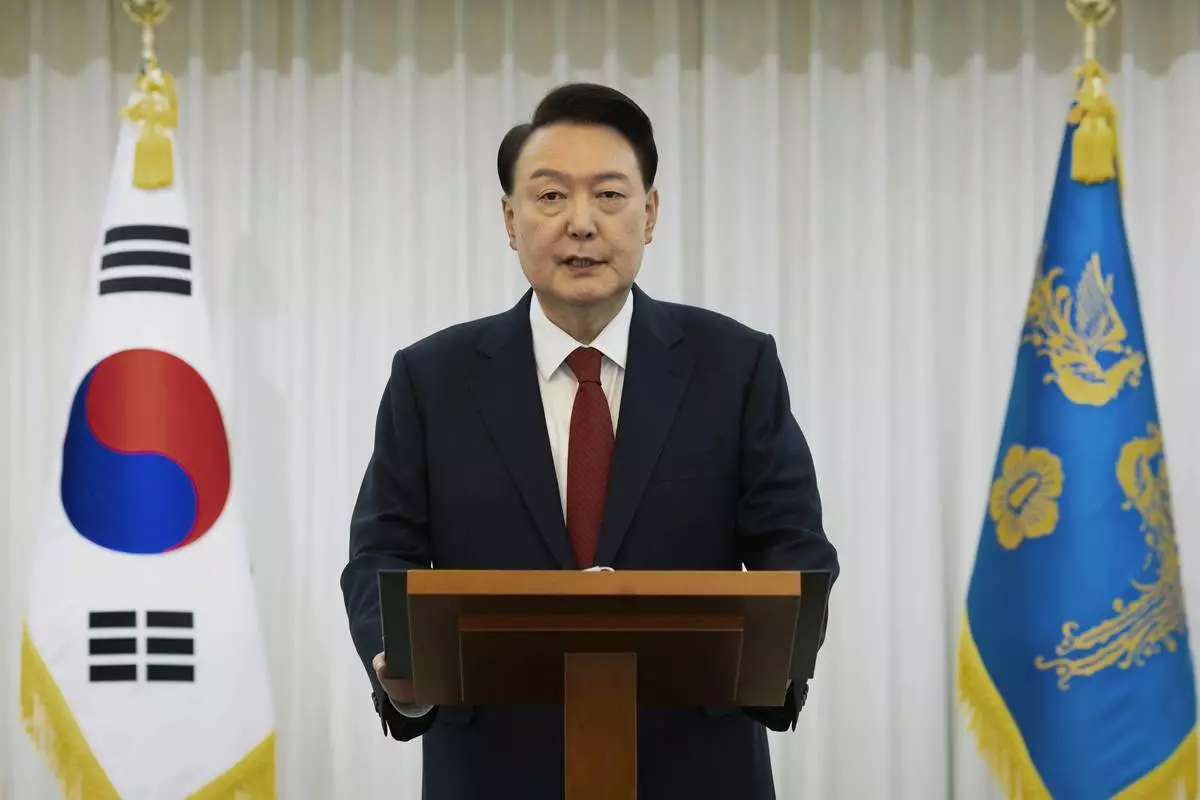
FILE - In this photo provided by the South Korean President Office, the country's President Yoon Suk Yeol speaks at the presidential residence in Seoul, South Korea, Dec. 14, 2024. (South Korean Presidential Office via AP, File)




